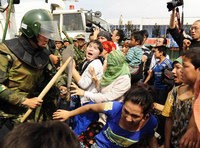A string of self-immolations and a dramatic crackdown in China's Sichuan Province has kept Tibet in the public eye in recent months. Yet the deaths of 20 people in violent clashes Tuesday in China's other restive border region, the Xinjiang Uighur Autonomous Region, brought Beijing’s other major domestic crackdown back into the international spotlight.
Xinjiang is home to a large population of ethnically Turkic Uighurs, who refer to their homeland as East Turkestan and have long resented Chinese rule. In recent years, restrictions on the use of the Uighur language in schools, an influx of Han Chinese migrants and curbs on the religious freedoms of the Muslim Uighurs have exacerbated ethnic tensions.
According to the Dui Hua Foundation, in 2011 Xinjiang saw a 10 percent increase in trials for crimes associated with political repression, such as endangering state security and separatism, as compared with figures for 2010. In January, the regional government announced plans to hire 8,000 new police officers to be deployed to rural areas of Xinjiang. And during a recent campaign against "illegal religious activities," authorities arrested 129 Uighurs, fined nearly 3,000 more and closed roughly 200 mosques in the city of Hotan alone.

